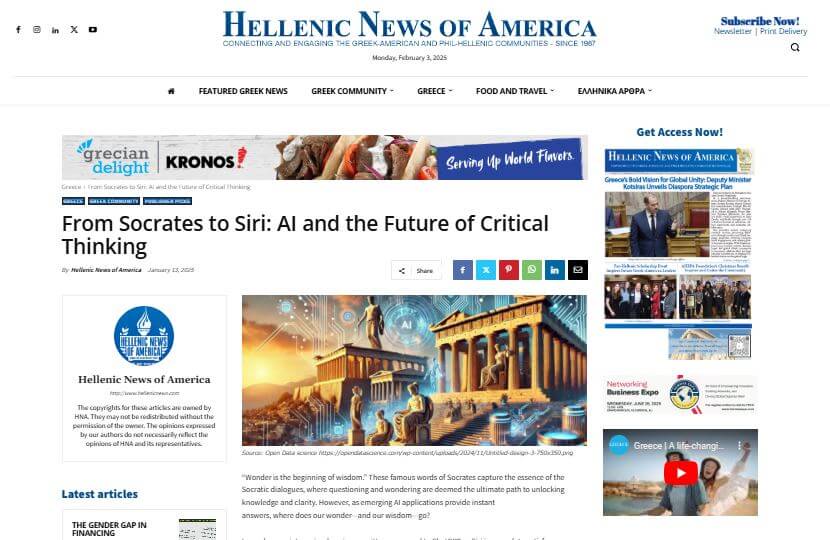Javascript must be enabled to continue!
From Socrates to Siri: AI and the Future of Critical Thinking
04-02-2025 08:49
Read full text in Greek
Greece is making significant strides in AI innovation, positioning itself as one of the seven nations selected to establish and operate one of the first AI factories in Europe, funded by the European Commission under a joint initiative worth a total of 1.5 billion euros. While historically lagging behind in digital transformation compared to other nations, Greece aims to catch up through government-backed initiatives like the National Digital Strategy, which seeks to integrate AI into education, healthcare, and public administration—in practically every aspect of daily life. PM Kyriakos Mitsotakis has emphasized that “AI is a unique tool that must now be integrated into public policies,” noting its potential to simplify life in our cities.
As promises of rapid innovation and modernization attract global attention and support, profound ethical dilemmas remain—especially for a nation whose identity is so deeply rooted in intellectual inquiry. The risk, however, isn’t just in privacy breaches or algorithmic biases; it’s in the subtle ways AI could shape how we think—or ultimately stop us from thinking at all.
“The real challenge isn’t that AI can’t provide answers, but that we must decide to question them. Tools like ChatGPT can offer facts, but they fail to capture the deeper complexities of life—those moments of doubt, moral struggle, and emotional depth,” states Alkis Gounaris, a professor of philosophy at the National and Kapodistrian University of Athens. “When humans defer entirely to algorithms, the rich tapestry of human thought—characterized by doubt, curiosity, and reflection—begins to unravel. We lose the capacity to ask the ‘why’ behind the ‘what.’”
In education, for instance, the Greek government aims to integrate AI into classrooms through the AI4edu program: a system that provides tailored support to learning for both teachers and students through the interactive adaptive assistant, Study Buddy. Engaging with students in natural language, the Study Buddy assistant could simulate Socratic-style dialogues, engaging students in thought-provoking debates and challenging their perspectives. Instead of providing definitive “truths,” AI systems could encourage learners to explore different viewpoints, dig deeper, and question their assumptions.
“When used thoughtfully, AI can augment human intellect, providing new insights and tools to enhance critical thinking,” Gounaris adds.
Full article here: Hellenic News of America
Read full text in Greek


